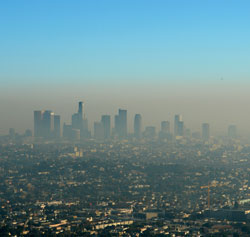
A new study reveals more than 38,000 people die around the world due to the pollutants that diesel engines emit into the air.
At least 38,000 people worldwide die each year because diesel vehicles routinely exceed emissions standards in real-world driving conditions, according to a new report published in the scientific journal Nature.
On average, diesel vehicles produce at least 50% more particulate soot, smog-causing oxides of nitrogen and other pollutants than would appear to be the case based on static emissions tests, the study revealed.
“The consequences of excess diesel NOx emissions for public health are striking,” wrote Susan Anenberg of Environmental Health Analytics, one of the members of the team that conducted the new research study.
The report is the latest to raise concerns about diesel emissions and the validity of government testing. And it follows on the scandal that has enveloped Volkswagen since the U.S. Environmental Protection Agency revealed in September 2015 that the maker had rigged two of its diesel engines to sharply reduce emissions when undergoing government testing. In real-world conditions, the EPA reported, those same engines would produce up to about 40 times more pollution.
The EPA and its counterparts in Europe and other parts of the world have been reexamining a number of diesel vehicles to see if they also are using so-called “defeat devices” intended to fool emissions tests. The U.S. agency has accused Fiat Chrysler Automobiles of similar subterfuge, a charge the automaker staunchly refutes.
(Daimler calls it quits on U.S. diesels for 2017. For the story, Click Here.)

The U.S. is less impacted by the pollutants from diesel engines due to low acceptance rate of the engines by consumers.
Several automakers have faced similar suspicions in Europe, though regulators have cleared others, including Opel, in recent months.
But many experts warn that the problem is not necessarily with what automakers are secretly doing to cheat, but with the emissions tests themselves. Though designed to ensure repeatability, critics allege, the tests don’t come close to replicating what happens when diesel vehicles operate on the road.
“This important study shows that there is a measurable effect on deaths from ‘excess NOx’ owing to the extremely flawed EU emissions tests for diesel cars,” Jonathan Grigg, an expert in child respiratory and environmental medicine at Queen Mary University of London, told the British newspaper, the Guardian.
The new study published in Nature estimates that excess levels of particulates – which are linked to diseases such as lung cancer – in real-world conditions account for about 31,400 additional deaths each year. Excess NOx, linked to asthma, heart disease and other ailments, catches blame for an additional 6,600 deaths annually.
Since diesels hold only a small share of the U.S. automotive market, the study estimated such vehicles cause about 1,100 deaths each year in the States. In Europe, however, where diesels account for about half of all new vehicles, the study says there are an extra 11,500 deaths annually. Add another 10,600 in China and 9,300 in India.
(VW declares “the future is electric.” Click Here for the story.)
While emissions tests came under withering fire in the study, the researchers did fault automakers for not going as far as they could to reduce diesel tailpipe pollutants. The team noted that diesels sold in the U.S. have far lower emissions levels – both in controlled lab tests and on the road – because of stricter American mandates.
The VW scandal has put a spotlight on diesel pollution. A study released by MIT earlier this year estimated that the maker’s cheating could be linked to an additional 1,200 premature deaths in Europe between 2008 and 2015 due to pollution.
The German maker has so far paid out about $30 billion in the U.S. as a result of the scandal in the form of fines and penalties, a vehicle buyback program and other agreements. That includes about $1 billion VW has agreed to spend to help promote sales of battery-cars and other zero-emissions vehicles. The company has also begun shifting its medium to long-term plans away from diesels to electrified products, with plans to offer 30 pure battery-electric vehicles by 2025.
The VW brand no longer plans to sell diesels in the U.S., though officials this month said the technology will remain a “significant” part of its global portfolio for the foreseeable future.
But the new study could fuel a push by some regulators, politicians and environmentalists to further restrict diesel usage. The city of Paris, for example, is weighing the idea of banning the powertrain technology entirely. In Los Angeles, there is a push to replace the diesel trucks used at the city’s various shipping ports, their emissions blamed for a significant portion of the area’s air pollution.
(To see more about the Chevy Cruze diesel getting near-hybrid mileage ratings, Click Here.)
Diesel proponents, however, insist the technology has become much cleaner and that it is a good way to reduce carbon dioxide emissions – which are linked to global warming – because of their higher fuel economy.
